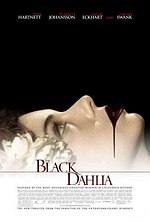 The Black Dahlia is a film that will be widely misunderstood by many of the people who see it. This isn't to say that the studio is guilty of misleading promotion and advertisement, but the overriding theme is going over a lot of people's heads, from what I've been hearing and reading. People will go to Black Dahlia expecting a noirish tale of the seedier parts of LA and it's citizens in the 40s, and they will get that. But the title, referring to the infamous unsolved murder that hung over the LAPD for years, and still does to a lesser extent today, might not only refer to murdered "actress" Elizabeth Short, but also "The Black Dahlia" as a metaphor for forbidden desires that shouldn't be fufilled, and what happens if those desires are fufilled.
The Black Dahlia is a film that will be widely misunderstood by many of the people who see it. This isn't to say that the studio is guilty of misleading promotion and advertisement, but the overriding theme is going over a lot of people's heads, from what I've been hearing and reading. People will go to Black Dahlia expecting a noirish tale of the seedier parts of LA and it's citizens in the 40s, and they will get that. But the title, referring to the infamous unsolved murder that hung over the LAPD for years, and still does to a lesser extent today, might not only refer to murdered "actress" Elizabeth Short, but also "The Black Dahlia" as a metaphor for forbidden desires that shouldn't be fufilled, and what happens if those desires are fufilled.The film opens with the voiceover of Officer Dwight "Bucky" Bleichert (Josh Hartnett) over a massive brawl in the streets between sailors and local Hispanics, being occasionally broken up by Officer Bleichert, and Sergeant Lee Blanchard (Aaron Eckhart), his future partner. The two are dubbed "Fire and Ice" by the media, for Blanchard's hot disposition, and Bleichert's more stoic demeanor. We see the two partners compete in a boxing match, and do practicially everything together along with Blanchard's significant other, the sultry Kay Lake (Scarlett Johansson). Before long, the relative peacefulness of their lives is disrupted by the discovery of wannabe actress Elizabeth Short's mutilated body, and the shadow of The Black Dahlia is cast over the assembled players. The film continues from there in labyrinthine fashion, introducing us to Madeleine Linscott (Hilary Swank), and the secrets she holds that threaten to unravel the mystery of why Elizabeth Short died, and other terrible things.
The mystery of why Elizabeth Short was killed is not the focus of the film, but rather serves as a MacGuffin that illuminates, and gives drive to the secrets surrounding the other characters. Why is Lee so high-strung about a pimp named DeWitt and his imminent release from jail? Why does he make Bucky promise not to ask Kay about it? And just how involved is Madeleine anyway?
While TBD is not as good a film as L.A. Confidential, the other high profile James Ellroy film adaptation, it does do a better job of conveying "The Demon Dog of American Crime Fiction"'s dark vision. A word that I've heard a lot of people use in describing the film is "modern" due to the presence of nudity, violence, and cussing. I disagree. While these things wouldn't have been shown in older films, they are true to the general time period and setting shown in the film. Josh Hartnett turns in a solid performance that shows that he can indeed carry a film, and shows great promise. Hilary Swank, Aaron Eckhart, and Scarlett Johansson are all good as usual, but the breakout performance here comes from Fiona Shaw, aka Aunt Petunia Dursley from the Harry Potter films. With no more than five minutes of screen time, she shreds the competition with a performance that teeters towards melodrama, but doesn't quite cross over. All of this is framed by DePalma's vivid depiction of 40s LA, with the occasional soft-focus thrown in for old-timey charm.
There's a lot of negative buzz flying around about The Black Dahlia, which made me enjoy it a lot more than I though it would. While not an excellent film, it's not terrible either. I give it a 7 on the 22 scale.
1 comment:
So, Your Racist Friend, what makes this movie a 7 rather than a 17? You mentioned several times that it wasn't a great movie, but why?
Post a Comment